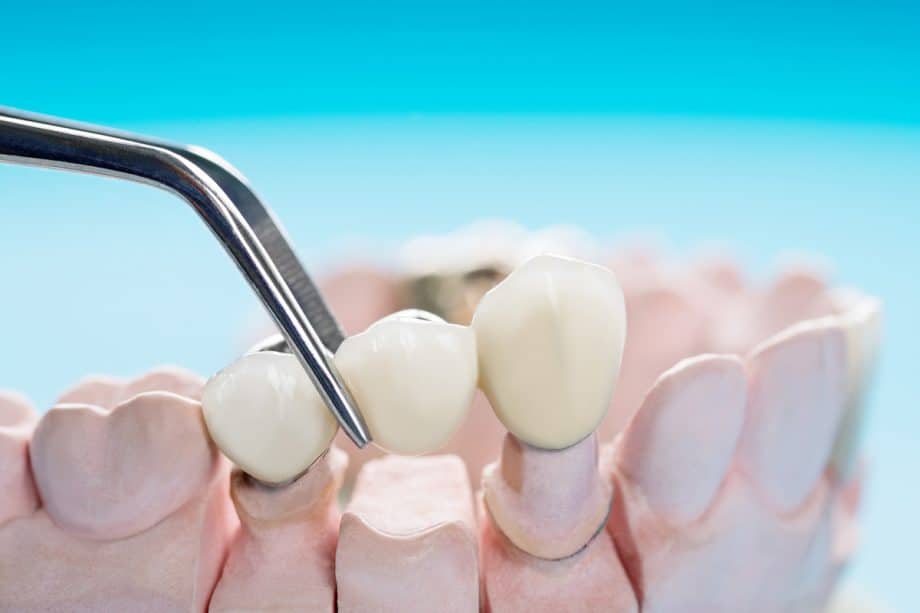A dental bridge is a fixed partial denture that replaces one or more missing teeth. A bridge can be made of porcelain, metal, or a combination of both materials and is permanently cemented to the surrounding teeth.
Bridges close gaps between teeth where one or more natural teeth are missing. The prosthetic component (crown) is placed over the gap left by the missing tooth or teeth. A bridge not only fills the gap but helps support your bite and retain your adjacent teeth.
A dental bridge can help you maintain optimal dental health despite missing teeth. In addition to restoring your appearance and smile, bridges restore the ability to chew properly and speak clearly. Bridges also prevent remaining teeth from drifting out of position.
Different Types of Dental Bridge Appliances
Several types of bridges are available:
Traditional bridges are the most common type of dental bridge and consist of a pontic (replacement tooth) attached to two crowns on either side. These crowns are fitted over the natural teeth or implants surrounding the empty space to support the pontic.
An implant-supported bridge is a permanent device attached to the jawbone using titanium rods or screws. The bridge itself spans the gap where teeth are missing, giving the appearance of regular teeth. Unlike other bridges, this type must be surgically implanted and requires additional time for the healing process to secure the implant into the jawbone.
Reasons for Getting a Dental Bridge
The loss of even a single tooth can significantly affect your oral health. The imbalance caused by missing teeth can lead to gum disease and temporomandibular joint (TMJ) disorders. A dental bridge replaces missing teeth and restores function.
If you have one or more missing teeth, you may experience:
- Difficulties eating and speaking
- Changes in your bite
- Shifting of adjacent teeth into the space left by the missing tooth
- Drifting of teeth from one side of the mouth to the other
- Chronic jaw pain
- Increased plaque buildup and gum disease
Preparation for Dental Bridge Procedure
You’ll be given a local anesthetic to numb the treatment area before the procedure begins. All dental bridges are custom fabricated in a laboratory and designed to fit your mouth precisely.
The dentist will remove any decay or damaged tooth structure and shape the teeth on either side of the gap. Impressions of the teeth are taken and sent to a laboratory for fabrication of the bridge and crowns.
A temporary bridge is placed to protect the exposed teeth and gums until your permanent bridge is ready. When your permanent bridge arrives, you’ll return to have it fitted and cemented into place.
What to Expect After the Procedure
Like other dental procedures, dental bridges may have some mild side effects depending on your unique situation, the technique used, and the materials chosen.
How Long Does it Take to Recover From a Dental Bridge?
The recovery time is relatively short, and the best thing you can do is keep the area clean and take good care of yourself after your procedure.
What Side Effects May Occur After a Dental Bridge?
It’s normal for your mouth to feel slightly sore after a dental bridge. If this occurs, try rinsing with warm saltwater. You may experience some swelling of the gums, which you can alleviate by applying ice packs to your face for 15-20 minutes every hour or so.
If you experience pain or discomfort, you can take over-the-counter pain medication such as ibuprofen or acetaminophen.
Call your dentist if these symptoms worsen or don’t subside after two days.
Once a dental bridge has been fitted, you can expect it to last for many years with proper care. Brush twice daily, floss nightly, and see your dentist regularly for check-ups and cleanings.
Learn If a Dental Bridge is the Right Option for You
A dental bridge can restore your smile, giving you back your self-confidence and allowing you to face the world with renewed pride in your appearance.
If you’re interested in a dental bridge or another restorative dental procedure, contact us today at (813) 238-7725 to schedule an appointment for a consultation with Dr. Luz Hernandez.


